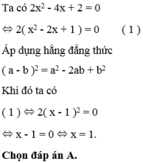Tìm x nguyên thỏa mãn : 3x3 - 2x2 + 4x + 1 = 0
Hãy nhập câu hỏi của bạn vào đây, nếu là tài khoản VIP, bạn sẽ được ưu tiên trả lời.


Bài 1:
a) Ta có: \(P=1+\dfrac{3}{x^2+5x+6}:\left(\dfrac{8x^2}{4x^3-8x^2}-\dfrac{3x}{3x^2-12}-\dfrac{1}{x+2}\right)\)
\(=1+\dfrac{3}{\left(x+2\right)\left(x+3\right)}:\left(\dfrac{8x^2}{4x^2\left(x-2\right)}-\dfrac{3x}{3\left(x-2\right)\left(x+2\right)}-\dfrac{1}{x+2}\right)\)
\(=1+\dfrac{3}{\left(x+2\right)\left(x+3\right)}:\left(\dfrac{4}{x-2}-\dfrac{x}{\left(x-2\right)\left(x+2\right)}-\dfrac{1}{x+2}\right)\)
\(=1+\dfrac{3}{\left(x+2\right)\left(x+3\right)}:\dfrac{4\left(x+2\right)-x-\left(x-2\right)}{\left(x-2\right)\left(x+2\right)}\)
\(=1+\dfrac{3}{\left(x+2\right)\left(x+3\right)}\cdot\dfrac{\left(x-2\right)\left(x+2\right)}{4x+8-x-x+2}\)
\(=1+3\cdot\dfrac{\left(x-2\right)}{\left(x+3\right)\left(2x+10\right)}\)
\(=1+\dfrac{3\left(x-2\right)}{\left(x+3\right)\left(2x+10\right)}\)
\(=\dfrac{\left(x+3\right)\left(2x+10\right)+3\left(x-2\right)}{\left(x+3\right)\left(2x+10\right)}\)
\(=\dfrac{2x^2+10x+6x+30+3x-6}{\left(x+3\right)\left(2x+10\right)}\)
\(=\dfrac{2x^2+19x-6}{\left(x+3\right)\left(2x+10\right)}\)

Đáp án C
PT ⇔ m x 2 + 2 x 3 − 2 x 2 + 2 x + 2 = 0
→ t = x 2 + 2 x m t 3 − 2 t + 2 = 0 1 .
Ta có: f x = x 2 + 2 x , x ≤ − 3 ⇒ f x ≥ 3 ⇒ t ∈ 3 ; + ∞
1 ⇔ m = 2 t 2 − 2 t 3 = f t với t ∈ 3 ; + ∞ .
Ta có: f ' t = − 4 t 3 + 6 t 4 ⇒ f ' t = 0 ⇔ t = 3 2 ⇒ f t
nghịch biến trên 3 ; + ∞ ⇒ f 3 ; + ∞ t ≤ f 3 = − 2 27
Suy ra m ≤ − 2 27 ⇒ Có vô số giá trị của m.

\(\Leftrightarrow2x^2+x+2=y\left(2x-1\right)\)
\(\Leftrightarrow y=\dfrac{2x^2+x+2}{2x-1}=x+1+\dfrac{3}{2x-1}\)
\(y\in Z\Rightarrow\dfrac{3}{2x-1}\in Z\)
Mà x nguyên dương \(\Rightarrow2x-1>0\)
\(\Rightarrow2x-1=Ư\left(3\right)\Rightarrow x=\left\{1;2\right\}\)
\(\Rightarrow\left(x;y\right)=\left(1;5\right);\left(2;4\right)\)

c. Ta có h(x) = 0 ⇒ 5x + 1 = 0 ⇒ x = -1/5
Vậy nghiệm của đa thức h(x) là x = -1/5 (1 điểm)

Lời giải:
$x^2+4x-y^2=0$
$\Leftrightarrow (x+2)^2-4-y^2=0$
$\Leftrightarrow (x+2)^2-y^2=4$
$\Leftrightarrow (x+2-y)(x+2+y)=4=2.2=(-2)(-2)$
Đến đây là dạng pt tích cơ bản rồi, bạn chỉ cần xét các trường hợp cụ thể để tìm ra $x,y$ thôi.

a) \(6xy+4x-9y-7=0\)
\(\Leftrightarrow2x.\left(3y+2\right)-9y-6-1=0\)
\(\Leftrightarrow2x.\left(3y+x\right)-3.\left(3y+2\right)=1\)
\(\Leftrightarrow\left(2x-3\right).\left(3y+2\right)=1\)
Mà \(x,y\in Z\Rightarrow2x-3;3y+2\in Z\)
Tự làm típ
\(A=x^3+y^3+xy\)
\(A=\left(x+y\right)\left(x^2-xy+y^2\right)+xy\)
\(A=x^2-xy+y^2+xy\)( vì \(x+y=1\))
\(A=x^2+y^2\)
Áp dụng bất đẳng thức Bunhiakovxky ta có :
\(\left(1^2+1^2\right)\left(x^2+y^2\right)\ge\left(x\cdot1+y\cdot1\right)^2=\left(x+y\right)^2=1\)
\(\Leftrightarrow2\left(x^2+y^2\right)\ge1\)
\(\Leftrightarrow x^2+y^2\ge\frac{1}{2}\)
Hay \(x^3+y^3+xy\ge\frac{1}{2}\)
Dấu "=" xảy ra \(\Leftrightarrow x=y=\frac{1}{2}\)

x^2-4x-21=x^2+3x-7x-21=x.x+3x-7x-7.3=x.(x+3)-7.(x+3)=(x+3).(x-7)
hoặc x+3=0 hoặc x-7=0
x=-3 x=7
vậy x=-3 hoặc x=7


Với \(x\in Z\)
\(3x^3-2x^2+4x+1=0\Leftrightarrow x\left(3x^2-2x+4\right)=-1\)
Ta có: \(-1=-1\cdot1=1\cdot\left(-1\right)\)
TH1: \(\hept{\begin{cases}x=-1\\3x^2-2x+4=3+2+4=9\left(\ne1\right)\end{cases}}\) (loại)
TH2: \(\hept{\begin{cases}x=1\\3x^2-2x+4=3-2+4=5\left(\ne-1\right)\end{cases}}\) (loại)
Vậy không có giá trị x nguyên nào thoả mãn \(3x^3-2x^2+4x+1=0\).